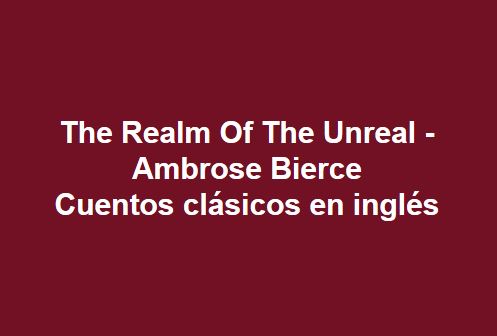
Recursos Educativos en Inglés - Stories in English
Cuentos clásicos en inglés
The Realm Of The Unreal - Ambrose Bierce
For a part of the distance between Auburn and Newcastle the road -- first on one side of a creek and then on the other -- occupies the whole bottom of the ravine, being partly cut out of the steep hillside, and partly built up with boulders removed from the creek-bed by the miners. The hills are wooded, the course of the ravine is sinuous. In a dark night careful driving is required in order not to go off into the water. The night that I have in memory was dark, the creek a torrent, swollen by a recent storm. I had driven up from Newcastle and was within about a mile of Auburn in the darkest and narrowest part of the ravine, looking intently ahead of my horse for the roadway. Suddenly I saw a man almost under the animal's nose, and reined in with a jerk that came near setting the creature upon its haunches.
'I beg your pardon,' I said; 'I did not see you, sir.'
'You could hardly be expected to see me,' the man replied civilly, approaching the side of the vehicle; 'and the noise of the creek prevented my hearing you.'
I at once recognized the voice, although five years had passed since I had heard it. I was not particularly well pleased to hear it now.
'You are Dr. Dorrimore, I think,' said I.
'Yes; and you are my good friend Mr. Manrich. I am more than glad to see you -- the excess,' he added, with a light laugh, 'being due to the fact that I am going your way, and naturally expect an invitation to ride with you.'
'Which I extend with all my heart.'
That was not altogether true.
Dr. Dorrimore thanked me as he seated himself beside me, and I drove cautiously forward, as before. Doubtless it is fancy, but it seems to me now that the remaining distance was made in a chill fog; that I was uncomfortably cold; that the way was longer than ever before, and the town, when we reached it, cheerless, forbidding, and desolate. It must have been early in the evening, yet I do not recollect a light in any of the houses nor a living thing in the streets. Dorrimore explained at some length how he happened to be there, and where he had been during the years that had elapsed since I had seen him. I recall the fact of the narrative, but none of the facts narrated. He had been in foreign countries and had returned -- this is all that my memory retains, and this I already knew. As to myself I cannot remember that I spoke a word, though doubtless I did.
Of one thing I am distinctly conscious: the man's presence at my side was strangely distasteful and disquieting -- so much so that when I at last pulled up under the lights of the Putnam House I experienced a sense of having escaped some spiritual peril of a nature peculiarly forbidding. This sense of relief was somewhat modified by the discovery that Dr. Dorrimore was living at the same hotel.
In partial explanation of my feelings regarding Dr. Dorrimore I will relate briefly the circumstances under which I had met him some years before. One evening a half-dozen men of whom I was one were sitting in the library of the Bohemian Club in San Francisco. The conversation had turned to the subject of sleight-of-hand and the feats of the prestidigitateurs, one of whom was then exhibiting at a local theatre.
'These fellows are pretenders in a double sense,' said one of the party; 'they can do nothing which it is worth one's while to be made a dupe by. The humblest wayside juggler in India could mystify them to the verge of lunacy.'
'For example, how?' asked another, lighting a cigar.
'For example, by all their common and familiar performances -- throwing large objects into the air which never come down; causing plants to sprout, grow visibly and blossom, in bare ground chosen by spectators; putting a man into a wicker basket, piercing him through and through with a sword while he shrieks and bleeds, and then -- the basket being opened nothing is there; tossing the free end of a silken ladder into the air, mounting it and disappearing.'
'Nonsense!' I said, rather uncivilly, I fear. 'You surely do not believe such things?'
'Certainly not: I have seen them too often.'
'But I do,' said a journalist of considerable local fame as a picturesque reporter. 'I have so frequently related them that nothing but observation could shake my conviction. Why, gentlemen, I have my own word for it.'
Nobody laughed -- all were looking at something behind me. Turning in my seat I saw a man in evening dress who had just entered the room. He was exceedingly dark, almost swarthy, with a thin face, black-bearded to the lips, an abundance of coarse black hair in some disorder, a high nose and eyes that glittered with as soulless an expression as those of a cobra. One of the group rose and introduced him as Dr. Dorrimore, of Calcutta. As each of us was presented in turn he acknowledged the fact with a profound bow in the Oriental manner, but with nothing of Oriental gravity. His smile impressed me as cynical and a trifle contemptuous. His whole demeanour I can describe only as disagreeably engaging.
His presence led the conversation into other channels. He said little -- I do not recall anything of what he did say. I thought his voice singularly rich and melodious, but it affected me in the same way as his eyes and smile. In a few minutes I rose to go. He also rose and put on his overcoat.
'Mr. Manrich,' he said, 'I am going your way.'
'The devil you are!' I thought. 'How do you know which way I am going?' Then I said, 'I shall be pleased to have your company.'
We left the building together. No cabs were in sight, the street cars had gone to bed, there was a full moon and the cool night air was delightful; we walked up the California Street Hill. I took that direction thinking he would naturally wish to take another, toward one of the hotels.
'You do not believe what is told of the Hindu jugglers,' he said abruptly.
'How do you know that?' I asked.
Without replying he laid his hand lightly upon my arm and with the other pointed to the stone sidewalk directly in front. There, almost at our feet, lay the dead body of a man, the face upturned and white in the moonlight! A sword whose hilt sparkled with gems stood fixed and upright in the breast; a pool of blood had collected on the stones of the sidewalk.
I was startled and terrified -- not only by what I saw, but by the circumstances under which I saw it. Repeatedly during our ascent of the hill my eyes, I thought, had traversed the whole reach of that sidewalk, from street to street. How could they have been insensible to this dreadful object now so conspicuous in the white moonlight.
As my dazed faculties cleared I observed that the body was in evening dress; the overcoat thrown wide open revealed the dress-coat, the white tie, the broad expanse of shirt front pierced by the sword. And -- horrible revelation! -- the face, except for its pallor, was that of my companion! It was to the minutest detail of dress and feature Dr. Dorrimore himself. Bewildered and horrified, I turned to look for the living man. He was nowhere visible, and with an added terror I retired from the place, down the hill in the direction whence I had come. I had taken but a few strides when a strong grasp upon my shoulder arrested me. I came near crying out with terror: the dead man, the sword still fixed in his breast, stood beside me! Pulling out the sword with his disengaged hand, he flung it from him, the moonlight glinting upon the jewels of its hilt and the unsullied steel of its blade. It fell with a clang upon the sidewalk ahead and -- vanished! The man, swarthy as before, relaxed his grasp upon my shoulder and looked at me with the same cynical regard that I had observed on first meeting him. The dead have not that look -- it partly restored me, and turning my head backward, I saw the smooth white expanse of sidewalk, unbroken from street to street.
'What is all this nonsense, you devil?' I demanded, fiercely enough, though weak and trembling in every limb.
'It is what some are pleased to call jugglery,' he answered, with a light, hard laugh.
He turned down Dupont Street and I saw him no more until we met in the Auburn ravine.
On the day after my second meeting with Dr. Dorrimore I did not see him: the clerk in the Putnam House explained that a slight illness confined him to his rooms. That afternoon at the railway station I was surprised and made happy by the unexpected arrival of Miss Margaret Corray and her mother, from Oakland.
This is not a love story. I am no story-teller, and love as it is cannot be portrayed in a literature dominated and enthralled by the debasing tyranny which 'sentences letters' in the name of the Young Girl. Under the Young Girl's blighting reign -- or rather under the rule of those false Ministers of the Censure who have appointed themselves to the custody of her welfare -- Love
veils her sacred fires,
And, unaware, Morality expires,
famished upon the sifted meal and distilled water of a prudish purveyance.
Let it suffice that Miss Corray and I were engaged in marriage. She and her mother went to the hotel at which I lived, and for two weeks I saw her daily. That I was happy needs hardly be said; the only bar to my perfect enjoyment of those golden days was the presence of Dr. Dorrimore, whom I had felt compelled to introduce to the ladies.
By them he was evidently held in favour. What could I say? I knew absolutely nothing to his discredit. His manners were those of a cultivated and considerate gentleman; and to women a man's manner is the man. On one or two occasions when I saw Miss Corray walking with him I was furious, and once had the indiscretion to protest. Asked for reasons, I had none to give, and fancied I saw in her expression a shade of contempt for the vagaries of a jealous mind. In time I grew morose and consciously disagreeable, and resolved in my madness to return to San Francisco the next day. Of this, however, I said nothing.
There was at Auburn an old, abandoned cemetery. It was nearly in the heart of the town, yet by night it was as gruesome a place as the most dismal of human moods could crave. The railings about the plots were prostrate, decayed, or altogether gone. Many of the graves were sunken, from others grew sturdy pines, whose roots had committed unspeakable sin. The headstones were fallen and broken across; brambles overran the ground; the fence was mostly gone, and cows and pigs wandered there at will; the place was a dishonour to the living, a calumny on the dead, a blasphemy against God.
The evening of the day on which I had taken my madman's resolution to depart in anger from all that was dear to me found me in that congenial spot. The light of the half moon fell ghostly through the foliage of trees in spots and patches, revealing much that was unsightly, and the black shadows seemed conspiracies withholding to the proper time revelations of darker import. Passing along what had been a gravel path, I saw emerging from shadow the figure of Dr. Dorrimore. I was myself in shadow, and stood still with clenched hands and set teeth, trying to control the impulse to leap upon and strangle him. A moment later a second figure joined him and clung to his arm. It was Margaret Corray!
I cannot rightly relate what occurred. I know that I sprang forward, bent upon murder; I know that I was found in the grey of the morning, bruised and bloody, with finger marks upon my throat. I was taken to the Putnam House, where for days I lay in a delirium. All this I know, for I have been told. And of my own knowledge I know that when consciousness returned with convalescence I sent for the clerk of the hotel.
'Are Mrs. Corray and her daughter still here?' I asked.
'What name did you say?'
'Corray.'
'Nobody of that name has been here.'
'I beg you will not trifle with me,' I said petulantly. 'You see that I am all right now; tell me the truth.'
'I give you my word,' he replied with evident sincerity, 'we have had no guests of that name.'
His words stupefied me. I lay for a few moments in silence; then I asked: 'Where is Dr. Dorrimore?'
'He left on the morning of your fight and has not been heard of since. It was a rough deal he gave you.'
Such are the facts of this case. Margaret Corray is now my wife. She has never seen Auburn, and during the weeks whose history as it shaped itself in my brain I have endeavoured to relate, was living at her home in Oakland, wondering where her lover was and why he did not write. The other day I saw in the Baltimore Sun the following paragraph:
'Professor Valentine Dorrimore, the hypnotist, had a large audience last night. The lecturer, who has lived most of his life in India, gave some marvellous exhibitions of his power, hypnotizing anyone who chose to submit himself to the experiment, by merely looking at him. In fact, he twice hypnotized the entire audience (reporters alone exempted), making all entertain the most extraordinary illusions. The most valuable feature of the lecture was the disclosure of the methods of the Hindu jugglers in their famous performances, familiar in the mouths of travellers. The professor declares that these thaumaturgists have acquired such skill in the art which he learned at their feet that they perform their miracles by simply throwing the "spectators" into a state of hypnosis and telling them what to see and hear. His assertion that a peculiarly susceptible subject may be kept in the realm of the unreal for weeks, months, and even years, dominated by whatever delusions and hallucinations the operator may from time to time suggest, is a trifle disquieting.'











